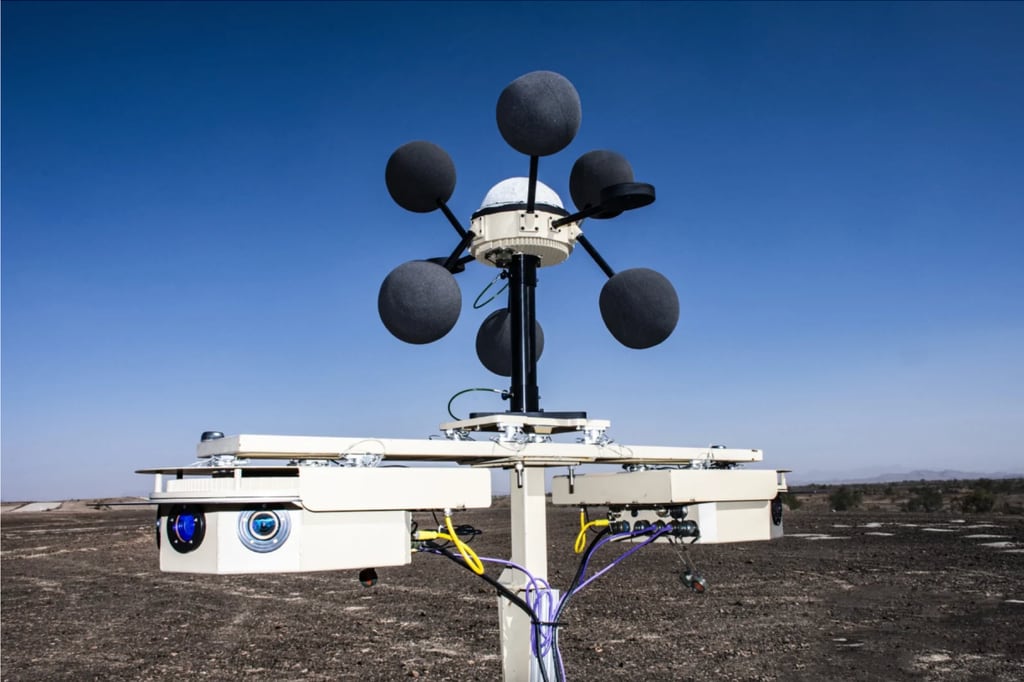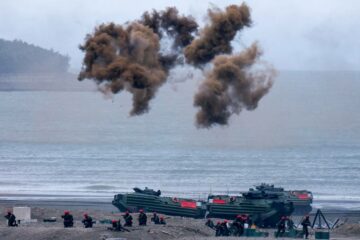
A subsidiary of Elbit Systems of America will supply the U.S. Army shot-spotting sensors that can be mounted to watch towers, surveillance aerostats, unmanned vehicles and more.
Logos Technologies announced a $19.4 million deal for its Serenity hostile fire detectors late last month. The five-year arrangement also accounts for maintenance and operation costs across U.S. Africa Command.
Serenity combines electro-optical and acoustic sensors to pinpoint the origin of weapons fire and explosions as far as 6 miles away. It can be paired with a wide-area motion imagery, or WAMI, device to document swaths of land over extended periods of time.
“Serenity can cue the WAMI system to a particular area of interest — say, the location of an enemy mortar team — and then the WAMI system can track their movement across the battlefield, as well as ‘go back in time’ and discover their initial staging area,” Doug Rombough, vice president of business development at Logos, said in a statement.
Serenity systems are already used by U.S. troops, Rombough added, and a quickly deployable version for international forces is under consideration. The Army Research Laboratory is also looking into a smaller version of Serenity that can be mounted on a gyrocopter, according to the company.
Counterterrorism missions across the African continent involve multiple countries and their forces. The region has been plagued by violent organizations affiliated with al-Qaida and the Islamic State group. In addition, coups in Mali in 2020, Burkina Faso in 2022 and Niger in 2023 have complicated U.S. Defense Department operations and assistance programs there.
Elbit Systems of America is itself a part of Israeli business Elbit Systems, the 21st largest defense contractor in the world when ranked by defense-related revenue. Elbit Systems earned nearly $5 billion in defense revenue in 2022 and about $4.8 billion in 2021, according to Defense News Top 100 analysis.
Colin Demarest is a reporter at C4ISRNET, where he covers military networks, cyber and IT. Colin previously covered the Department of Energy and its National Nuclear Security Administration — namely Cold War cleanup and nuclear weapons development — for a daily newspaper in South Carolina. Colin is also an award-winning photographer.
- SEO Powered Content & PR Distribution. Get Amplified Today.
- PlatoData.Network Vertical Generative Ai. Empower Yourself. Access Here.
- PlatoAiStream. Web3 Intelligence. Knowledge Amplified. Access Here.
- PlatoESG. Carbon, CleanTech, Energy, Environment, Solar, Waste Management. Access Here.
- PlatoHealth. Biotech and Clinical Trials Intelligence. Access Here.
- Source: https://www.defensenews.com/intel-geoint/isr/2024/03/05/elbit-systems-subsidiary-to-supply-shot-spotting-sensors-in-africa/
- :has
- :is
- :where
- 100
- 11
- 2020
- 2021
- 2022
- 2023
- 4
- 5
- 6
- 70
- 8
- a
- About
- According
- Accounts
- across
- added
- addition
- administration
- Affiliated
- africa
- African
- already
- also
- america
- an
- analysis
- and
- announced
- ARE
- AREA
- Army
- arrangement
- AS
- Assistance
- At
- award-winning
- away
- back
- Battlefield
- BE
- been
- Billion
- business
- business development
- by
- CAN
- Carolina
- cold
- combines
- company
- complicated
- consideration
- continent
- Contractor
- Costs
- countries
- covered
- covers
- cyber
- daily
- deal
- Defense
- Defense Department
- Department
- Department of Energy
- Development
- device
- discover
- document
- doug
- earned
- Elbit Systems
- energy
- explosions
- extended
- far
- Fire
- For
- Forces
- Group
- Have
- he
- hostile
- HTTPS
- images
- in
- initial
- interest
- International
- into
- involve
- Islamic
- Islamic State
- Israeli
- IT
- ITS
- itself
- laboratory
- Land
- largest
- Last
- Late
- location
- looking
- maintenance
- Military
- million
- missions
- Month
- more
- motion
- movement
- multiple
- namely
- National
- nearly
- networks
- news
- nuclear
- Nuclear weapons
- of
- on
- operation
- Operations
- or
- Origin
- over
- paired
- part
- particular
- periods
- photographer
- plagued
- plato
- Plato Data Intelligence
- PlatoData
- president
- previously
- Programs
- quickly
- ranked
- region
- reporter
- research
- revenue
- s
- Said
- say
- security
- sensors
- serenity
- smaller
- South
- South carolina
- staging
- State
- Statement
- subsidiary
- supply
- surveillance
- system
- Systems
- team
- Technologies
- that
- The
- their
- then
- There.
- time
- to
- top
- track
- u.s.
- under
- used
- Vehicles
- version
- vice
- Vice President
- war
- Watch
- Weapons
- WELL
- when
- will
- with
- zephyrnet












